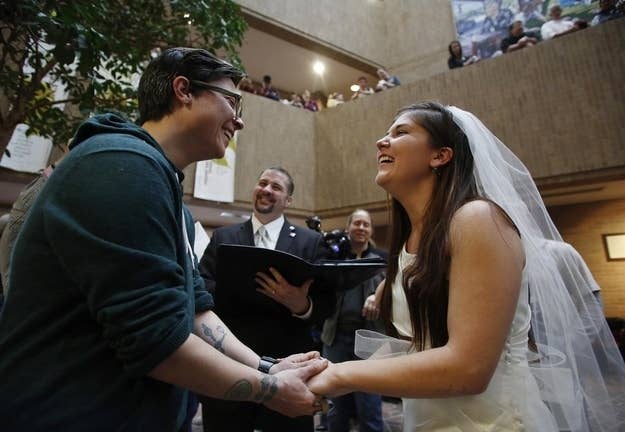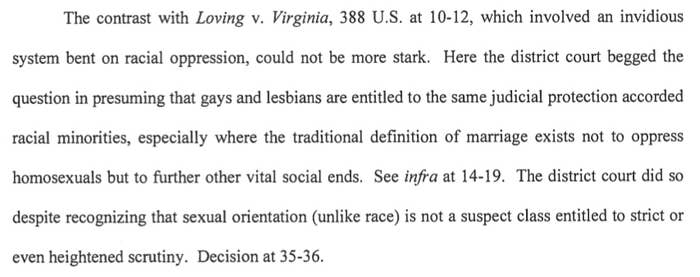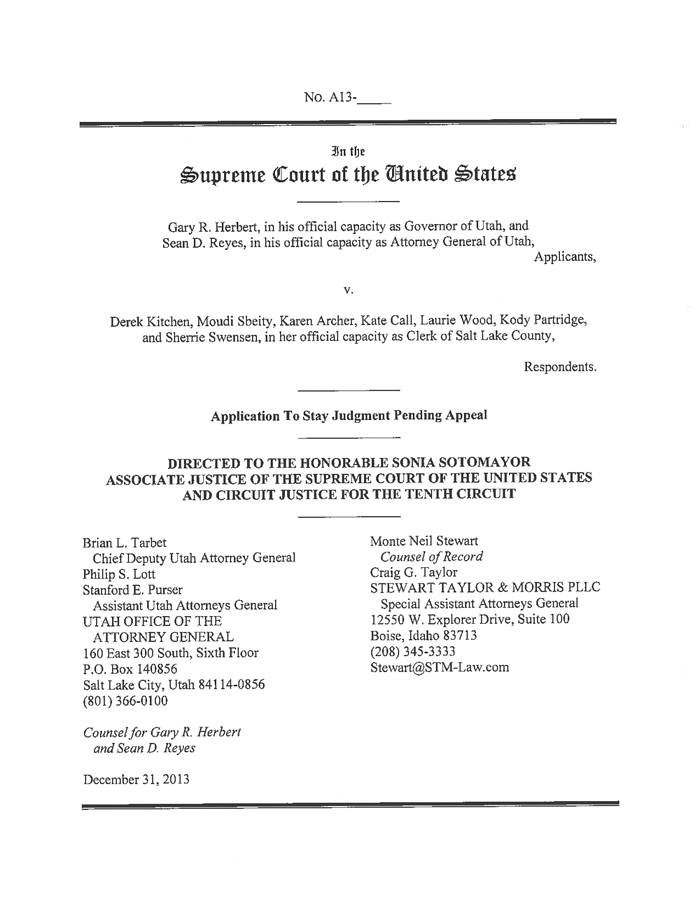
WASHINGTON — The Utah Attorney General's Office has asked the Supreme Court to step in and stop same-sex couples from marrying while it appeals a trial court decision striking down its amendment banning such marriages.
The filing, an application to stay judgment pending appeal, was filed with Justice Sonia Sotomayor, who can decide the motion on her own or refer it to the entire court to decide.
The lawyers for Utah first argue that the Supreme Court would be likely to accept the case, Kitchen v. Herbert, on appeal should it — currently on appeal before the 10th Circuit Court of Appeals — later be appealed to them.
Then, the lawyers argue that they are likely to succeed on appeal and that the Dec. 20 ruling for U.S. District Judge Robert Shelby will be overturned.
"Justice Sotomayor has called for a response due by noon E.S.T. on Friday, January 3, 2014," the Supreme Court's public information office told BuzzFeed Tuesday afternoon, earlier reported by Appellate Daily's Michelle Olsen and likely meaning that Sotomayor will be able to keep her plans to lead the Times Square ball drop at midnight Tuesday to ring in 2014.
Writing that the Supreme Court decision in United States v. Windsor was "based in significant part on federalism concerns," they conclude, "[T]he district court not only refused to accommodate Utah's definition [of marriage] for purposes of federal law, it altogether abrogated the decisions of the State and its citizens, acting through every available democratic channel, to define marriage in the traditional way. The district court's decision was therefore a far greater 'federal intrusion on state power' than the intrusion invalidated in Windsor."
Utah does not believe this case is like the Supreme Court case that ended state bans on interracial marriage:

The final reason that Utah argues that the case will be overturned on appeal is "the large and growing body of social science research contradicting the central premise of the district court's due process and equal protection holdings: i.e., its conclusion that there is no 'rational reason'—much less any compelling reason—for restricting marriage to same-sex couples."
Which leads to Utah's argument that states should be able to encourage opposite-sex parenting:

In responding to one of the other standards for granting a stay, they argue that allowing same-sex couples to marry now, the result of Shelby's judgment in the case, "imposes certain—not merely likely—irreparable harm on the State and its citizens."
This is so because, they argue, "Every single marriage performed between persons of the same sex as a result of the district court's injunction—and in defiance of Utah law—is thus an affront to the sovereignty of the state and its people."
Refusing to issue a stay while higher courts have not yet reviewed Shelby's initial decision "places in jeopardy the democratic right of millions of Utahns to choose for themselves what marriage will mean in their community."
The "practical consequences" of not issuing a stay relate to the same-sex couples being married currently in Utah. If the state succeeds on appeal, the state's lawyers argue, "the State inevitably will confront the thorny problem of whether and how to unwind the marital status of same-sex unions performed before the reversal of the district court's decision."
Seeking a stay, the state argues, is made in part on behalf of same-sex couples:

Finally, they argue, the "balance of equities" favor a stay being granted because the public has an "overwhelming interest in maintaining the status quo" prior to Shelby's judgment until the 10th Circuit and Supreme Court have a chance to review the case.
These arguments were rejected by Shelby and by the 10th Circuit previously.
As reported on Monday, Monte Stewart — a former Supreme Court clerk and former U.S. Attorney at Stewart, Taylor and Morris — is serving as outside counsel to Utah on the case. Stewart, who has worked extensively to oppose same-sex couples' marriage rights, also is counsel of record in Tuesday's filing to Sotomayor.
James Magleby, one of the lawyers for the plaintiffs in the case, said in a statement, "[A]side from the lack of merit to the State's request to SCOTUS for a stay, the Tenth Circuit has already established a rare, expedited briefing schedule on these issues, and hundreds of same-sex couples have already been married in Utah; thus, there is no emergency need for a stay."
Additionally, he urged the state to drop its appeal, noting, "The State of Utah should carefully consider its other options, in particular the fiscally responsible decision by New Jersey Governor Chris Christie, to save his state from further legal expenditures and to put a divisive issue in the past, by deciding not to pursue an appeal from an analogous ruling."
After the Supreme Court filing, the state announced a "request for proposals" on Tuesday, asking for "qualification and fee proposals for outside counsel to assist with the case of Kitchen et al. v. Herbert et al., case number 13-4178 pending before the U.S. Court of Appeals for the 10th Circuit and potentially the U.S. Supreme Court." The proposals are due by 5 p.m. Jan. 7, 2014. It was not clear if the potential new outside counsel would replace Stewart or supplement the services being provided by his firm.
This post was updated as additional information became available, with the final update at 6:30 p.m.

